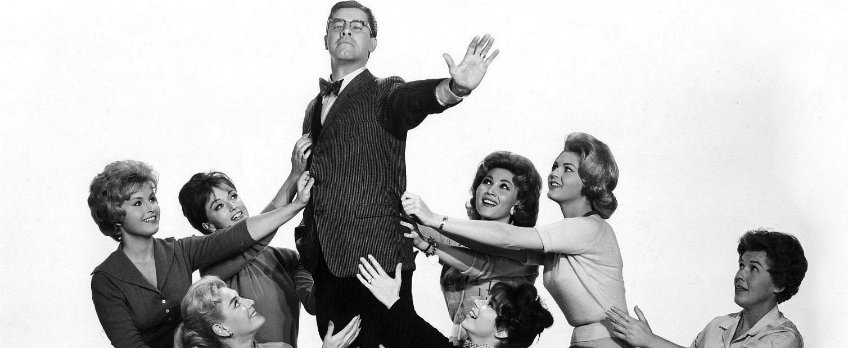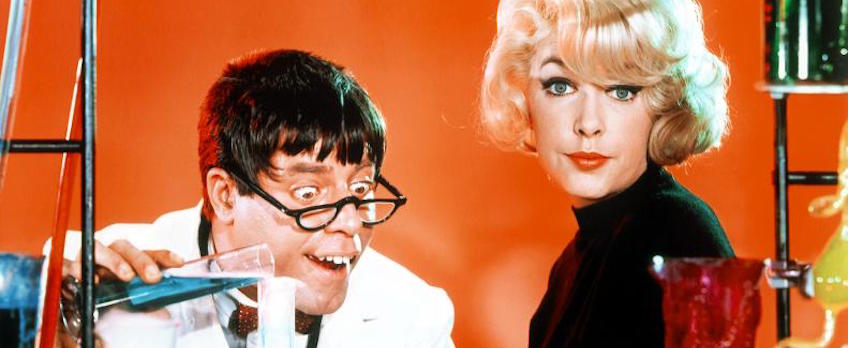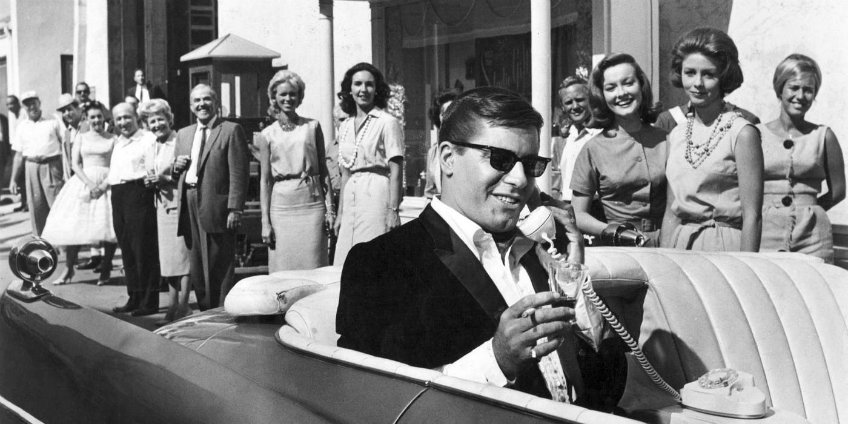Double Fantasy: Jerry Lewis’s The Ladies Man and The Nutty Professor

Jessica Ellicott, Critics Campus 2016
The characters Jerry Lewis plays often find refuge from reality in fantasy – in small strokes of magic that allow their desires to find outward manifestation on screen. Just as Chaplin once made a feast out of his shoe, so it is that starving artist Eugene Fullstack turns his baked beans and coffee into steak and champagne in Tashlin’s Artists and Models (1955), and Stanley conducts an imaginary orchestra on an empty stage in The Bellboy (1960). Two particularly vivid examples of how Lewis realises these fantasies can be found in The Ladies Man (1961) and The Nutty Professor (1962), in two sequences involving acts of self-transformation.
In each film, the main character has a serious case of woman troubles. In The Ladies Man, Lewis plays the sweet-natured, klutzy child-man Herbert H. Heebert, a college valedictorian from the “very nervous little community” of Milltown, New Jersey. After catching his would-be betrothed in the arms of another, he swears off women: panicking in the face of any potential romantic encounter, only feeling safe around surrogate mother types like housekeeper Katie (Kathleen Freeman). And in The Nutty Professor, the older, more nebbish Professor Kelp has a major crush on his young blonde student Stella Purdy, but his acute awareness of his own deficiencies as a man prevent him from pursuing this crush any further than his classroom fantasies.
For much of The Ladies Man, Herbert is seen hard at work zooming up and down the multiple floors of the ladies’ boarding house, attending to the needs of its immaculate inhabitants. While doing the mail run, Herbert is about to knock on one lady’s door when Katie stops him, saying, “We never knock on that door. We never bother Miss Cartilage.” Of course, this only acts to position Miss Cartilage’s room as an alluring forbidden space for Herbert – allowing his curiosity to build until he eventually musters up the courage to enter later on, when he is sure no one is looking.
Herbert’s stint in Miss Cartilage’s room unfolds like a dream sequence, her room possessing its own spatial laws liberated from the constraints of reality. Poking his head through the cracks of the door, his eyes nearly bulge out of his head as he takes in the startling vision of her all-white boudoir. He sheepishly treads forth, stumbling upon the spider-like Miss Cartilage hanging from the ceiling, her body sheathed in black. She descends to investigate this male intruder, advancing on him with seductive strides as he makes attempts to retreat. Then, the fantasy begins. The far wall ascends, revealing the impossibly vast, Minnelli-esque ballroom behind. Miss Cartilage turns on a white record player, and a cut reveals that Herbert’s clothes have magically changed into a suit, and that Harry James and his big band have appeared. The pair dance, Miss Cartilage pursuing Herbert, and Herbert seemingly amazed at his sudden ability to tap dance. But the ever-evasive Herbert makes moves to escape, causing the wall to descend and his outfit to switch back. “Boy, what imagination can do for you,” he says after he closes the door behind him, confirming that the experience was one of pure fantasy.

Where Herbert moves inside the recesses of his own mind with Miss Cartilage, the reverse is true of Professor Kelp in The Nutty Professor, whose fantasies are brought forth into the real world. Once again, a forbidden zone prompts curiosity: Stella invites Kelp to a gathering at hip student bar The Purple Pit, which he regretfully declines because it’s “off limits to the faculty of the university.” Kelp then takes the potion which transforms him into the Mr Hyde to his Dr Jekyll – the hyper-masculine ladykiller Buddy Love.
As with the white room of Miss Cartilage, The Purple Pit is a magic space distinct from other locations in the film: a stage upon which Kelp can enact his fantasies through Buddy, who is able to command the authority and admiration Kelp so lacks. Buddy’s grand debut entrance into the Purple Pit stops everyone in their tracks, the dancing crowd pausing in awe to gaze upon this slick newcomer. Exerting his masculine dominance, he proceeds to the bar to order a cocktail so potent that it causes the bartender (played by Lewis’s regular tough guy Buddy Lester) to keel over from just one sip. He casts his true spell, though, in his rendition of That Old Black Magic that wins over the whole crowd – Stella included. As the song goes on, the initially slightly removed Stella moves closer and closer – her fawning face eventually shown in close-up, wide eyes cast lovingly in Buddy’s direction. As the song draws to a close, a shot from behind Buddy’s back shows the crowd, suddenly much fuller than when the song began, who erupt in enthusiastic applause. Kelp could hardly imagine a more vivid fantasy for himself.

Apart from being two of the most memorable depictions of fantasy in Lewis’s body of work, when comparing the two sequences, it becomes evident that they are closely linked, both formally and thematically. They both demonstrate the way Lewis uses defined spaces as fantasy stages, turning a literal space into a figurative one, a space which carves out a psychological compartment in both the mind of the character and the audience. Each sequence shows performance as a transformative act which brings both liberation and relief – Herbert freed through dance and Buddy Love finding acceptance through song. Most of all, though, these double fantasies show Lewis doing what he does best as both director and performer: creating joyful free-form cinematic visions that will continue to capture audiences’ imaginations for many years to come.